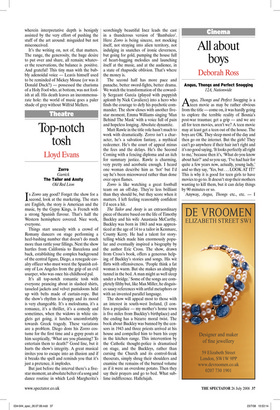Top-notch tosh
Lloyd Evans
Zorro Garrick The Tailor and Ansty Old Red Lion
Is Zorro any good? Forget the show for a second, look at the marketing. The stars are English, the story is American and the music, by the Gypsy Kings, is French with a strong Spanish flavour. That’s half the Western hemisphere covered. Nice work, everyone.
Things start uneasily with a crowd of Romany dancers on stage performing a heel-bashing number that doesn’t do much more than rattle your fillings. Next the show hurtles from California to Barcelona and back, establishing the complex background of the central figure, Diego, a renegade cavalry officer who must wrest the Spanish colony of Los Angeles from the grip of an evil usurper, who was once his childhood pal.
It’s all top-notch romantic tosh with everyone prancing about in slashed shirts, tasseled jackets and velvet pantaloons held up with belts made of curtain-rope. But the show’s rhythm is choppy and its mood is very changeable. It’s a melodrama, it’s a romance, it’s a thriller, it’s a comedy and sometimes, when the widows in white singlets get going, it lurches uncomfortably towards Greek tragedy. These variations are a problem. Diego dons his Zorro costume for the first time and a gypsy pouts at him sceptically, ‘What are you planning? To entertain them to death?’ Good line, but it hurts the show’s integrity. A great musical invites you to escape into an illusion and if it breaks the spell and reminds you that it’s just a pretence, it implodes.
But just before the interval there’s a fivestar moment, an absolute belter of a song and dance routine in which Lesli Margherita’s scorchingly beautiful Inez leads the cast in a thunderous version of ‘Bambaleo’. Here Zorro is being sincere, not mocking itself, not straying into alien territory, not indulging in snatches of ironic cleverness, but going for gold, pumping the house full of heart-hugging melodies and launching itself at the music, and at the audience, in a state of rhapsodic oblivion. That’s where the money is.
The second half has more pace and panache, better sword-fights, better drama. We watch the transformation of the cowardly Sergeant Garcia (played with puppyish aplomb by Nick Cavaliere) into a hero who finds the courage to defy his psychotic commander. The show closes with another fivestar moment, Emma Williams singing ‘Man Behind The Mask’ with a voice full of pain and hopeless longing. Absolute dynamite.
Matt Rawle in the title role hasn’t much to work with dramatically. Zorro isn’t a character, he’s a salvation fantasy, a mythical redeemer. He’s the court of appeal minus the fees and the delays. He’s the Second Coming with a fencing diploma and an itch for summary justice. Rawle is charming, very pretty and acrobatic enough. I heard one woman describe him as ‘hot’ but I’d say he’s been microwaved rather than done over open flames.
Zorro is like watching a great football team on an off-day. They’re less brilliant than they should be, but they score when it matters. I left feeling reasonably confident I’d seen a hit.
The Tailor and Ansty is an extraordinary piece of theatre based on the life of Timothy Buckley and his wife Anastasia McCarthy. Buckley was born in 1863 and was apprenticed at the age of 14 to a tailor in Kenmare, County Kerry. He had a talent for storytelling which made him enormously popular and eventually inspired a biography by the author Eric Cross. The show, drawn from Cross’s book, offers a generous helping of Buckley’s stories and songs. His wit flirts with offensiveness. ‘People think a fat woman is warm. But she makes an almighty tunnel in the bed. A man might as well sleep under a bridge.’ Some of the songs are completely filthy but, like Max Miller, he disguises saucy references with artful metaphors or with an invented parallel language.
The show will appeal most to those with an interest in south-west Ireland, (I confess a prejudice — my mother’s home town is five miles from Buckley’s birthplace) and the ending has a bizarre moral twist. The book about Buckley was banned by the censors in 1943 and three priests arrived at his house and compelled him to burn his copy in the kitchen range. This intervention by the Catholic thought-police is dramatised on stage, and the Buckleys, rather than cursing the Church and its control-freak theocrats, simply shrug their shoulders and examine the remains of the burned volume as if it were an overdone potato. Then they say their prayers and go to bed. What sublime indifference. Hallelujah.


























































 Previous page
Previous page